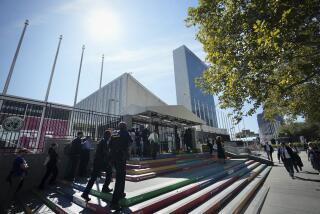Annan Sees Wiggle Room in U.N. Policy Toward Iraq
- Share via
UNITED NATIONS — Secretary- General Kofi Annan said Monday that he did not expect miracles from two days of meetings with an Iraqi delegation but was encouraged by signals that Security Council members are ready for a change in the U.N.’s Iraq policy.
“For a long time, the attitude had been, ‘This is our policy, this is the way we do things,’ ” Annan said. “But I think recently we have put on the table the question of ‘What should we be doing?’ I hope out of this review and search will emerge a constructive way forward.”
The first high-level U.N. meetings on the question of Iraq in more than two years, which were scheduled to resume today, are more of an exercise in breaking a stubborn stalemate than in breaking new ground. Annan said he would consider the talks a success if Iraq simply agreed to meet again, and by the end of Monday that goal had been met. Iraqi Foreign Minister Mohammed Said Sahaf said as he left U.N. headquarters for the day that there will be many future rounds.
But that seems to have been the first day’s biggest achievement. Iraq did not waver in its insistence that the U.N. lift decade-old sanctions it says are causing mass suffering. The U.N., in turn, stood by its requirement that Baghdad first allow inspectors to verify that Iraq has no weapons of mass destruction.
Sahaf said earlier Monday that Baghdad had fulfilled all of the Security Council’s requirements to disarm and that he was bringing detailed documents to prove it.
“That means an immediate lift of sanctions on Iraq,” he said.
Later, he added that Iraq will not allow weapons inspectors back into the country even if all the sanctions are lifted, unless they also visit every country in the region, beginning with Israel.
While the Security Council is far from removing the 1990 sanctions that ban the export to Iraq of all items that could possibly be used for military purposes, it is prepared to change its strategy, council members said.
France, Russia and China argue that the sanctions have hurt the Iraqi people and not the regime they are aimed at and that they should be suspended. The United States and Britain, which have long held out for keeping strict controls on everything but food and medicine, are reviewing their policies.
“Some of the thinking in London and some of the thinking in Washington is going along the same direction,” a British diplomat said. “We’re looking at narrower, smarter sanctions.”
British and American officials have met several times in the last month on Iraq. While details are elusive, their broad aim is the same: to ensure that President Saddam Hussein does not further his weapons program but to lessen the impact of sanctions on civilians.
That could mean that sanctions might start targeting specific Iraqi officials--banning travel and freezing bank accounts--while simultaneously easing import categories.
During the last few years, the U.S. has frozen about 1,600 purchasing contracts signed by Iraq and worth close to $3 billion, in part because of suspicions that the goods could be used for chemical or biological weapons. Because chemicals that can be turned into weapons are found in everything from shampoo to swimming pool chlorine, each contract must be approved by a special U.N. committee, a slow process that has retarded the Iraqi economy, U.N studies have found. To help speed the process, the U.N. commission in charge of monitoring and inspecting weapons is streamlining its list of banned “dual-use” items.
Other measures could include allowing broader economic activity by ordinary Iraqis to make them less dependent on the regime. Or, some diplomats say, the U.N. could drop demands for cooperation with arms inspectors and instead monitor Iraq’s borders, skies and seas for weapons materials, despite the logistical difficulties and high costs.
While Washington and London ponder how to make the sanctions less harmful, many entrepreneurs and smugglers have found ways to bypass the controls.
Arab neighbors, and even Security Council members France and Russia, have challenged the air embargo by sending humanitarian-aid and cargo flights to Baghdad without U.N. approval. The Pentagon said last week that one of the reasons behind the U.S.-British bombing raid earlier this month was that Chinese technicians had helped upgrade Iraq’s air defense system.
More to Read
Sign up for Essential California
The most important California stories and recommendations in your inbox every morning.
You may occasionally receive promotional content from the Los Angeles Times.













